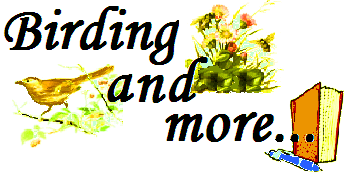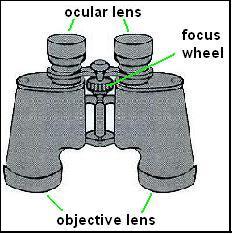 Newsletter
Newsletter
2010
/ Issue 3
IN THIS ISSUE: CHOOSING THE RIGHT BINOCULARS FOR BIRDING
.
Birds tend to keep their distance, so binoculars are essential for any birder who’d like to get a closer look. However, with so many shapes, sizes and designs, choosing the right binoculars for your birding needs can be a challenge. Hopefully this little article will help demystify the task. Binoculars are typically described by a couple of numbers like 8x21 or 10x50 – but what do these numbers mean? Well, the first number is the binoculars’ magnification. For instance, ‘8x’ means the binoculars will make things look 8 times as large as the unaided human eye. The second number refers to the size of the objective lens. For instance, ‘21’ means the objective lens has a diameter of 21mm. The larger the objective lens, the more light that is captured by the binoculars.
 The combination of 'objective lens' size and 'magnification' will
determine how bright an image will look through the binoculars. For
birding, you should choose binoculars which have an objective lens size
that is at least four times as big as the magnification (but no more
than 7 times). For instance, if you want '8x'
magnification, you should buy binoculars that are somewhere between
8x32 and 8x56.
The combination of 'objective lens' size and 'magnification' will
determine how bright an image will look through the binoculars. For
birding, you should choose binoculars which have an objective lens size
that is at least four times as big as the magnification (but no more
than 7 times). For instance, if you want '8x'
magnification, you should buy binoculars that are somewhere between
8x32 and 8x56.Other important factors to consider are:
Magnification: Best for birding is 7x, 8x, or 10x. The 10x will obviously get you a little closer, but lower magnifications are steadier and their inherently wider field of view will make it easier to spot birds.
Avoid zoom binoculars.
Lens coating: You'll want "multi-coated" lenses or "fully multi-coated" lenses. Avoid binoculars which only have "fully coated" lenses.
Focus type: You'll want centre focus, and the focus should be fluid and easy to use. The focus wheel should go from 'close-up' to 'infinity' within one full rotation or less. Avoid "no-focus" binoculars, and avoid those that have individual focus eyepieces.
Weight: To avoid fatigue, get a pair that is less than 30oz (that is, less than 850 grams).
Prism type: I would recommend the less expensive 'tried and true' porro prism system, but any system that fits your budget will do.
So, to sum up, you'll want binoculars that give you the best combination of power, brightness, and field of view. You'll want fast focus and you'll also want to be able to see close up. They should have centre focus with multi-coated lenses. They should feel comfortable in your hands and be as light weight as possible.
I recommend going to a store where you can try out several binoculars that match your specifications and pick the ones that perform well, feel right, and fit your budget.
What's New at www.birdingandmore.com
A new location has been added
to the Places to Bird page.
Several new posts were added to
the Birding and more
blog:
New pictures are always being
inserted into
the galleries, and now when you 'mouse over' the gallery
Icons you can see
Go to the website
and give it a try!
Picture
of the week
"Pine
Siskin"
From the Backyard
Birds gallery on our website
READER'S PATCH
This space is
for your photos, stories, and/or comments.
Send anything
you'd like to share with us to: newsletter@birdingandmore.com
Did you know that nuthatches listen to the alarm calls of the Black-capped Chickadee to get information about predators? An experiment at Templeton University revealed that the familiar Chickadee alarm call "chick-a-dee-dee-dee" contains a surprising amount of information - and nuthatches can understand it! From the call of the Chickadee, the nuthatches can tell if a nearby hawk, owl, or falcon poses a high or low danger. If the Chickadee sees the bird of prey in flight, hunting, it issues a soft, high-pitched "seet" call. If however, the predator is perched, the Chickadee issues a loud "chick-a-dee-dee-dee" to recruit other birds to harass the predator and hopefully chase it away.
 The
acoustic features of the Chickadee's call varies with the size of the
hawk, owl, or falcon that it has seen. The Templeton researchers
recorded the various calls of the Chickadee and played them back in the
woods where nuthatches were present. The experiments were conducted
when no Chickadees were around, so their behaviour wouldn't be an
influence on the nuthatches.
To quote the Templeton researchers: "The nuthatches exhibited strong
mobbing behavior - more of them responded, flew closer to the speaker
and appeared to be more agitated by flicking their wings when they
heard the small predator alarm than when they heard the large owl
alarm. It turns out that these animals are pretty smart. Knowing what
kinds of predators are around could be a matter of life or death for
them, so it pays for them to listen to the alarm calls of other
species."
The
acoustic features of the Chickadee's call varies with the size of the
hawk, owl, or falcon that it has seen. The Templeton researchers
recorded the various calls of the Chickadee and played them back in the
woods where nuthatches were present. The experiments were conducted
when no Chickadees were around, so their behaviour wouldn't be an
influence on the nuthatches.
To quote the Templeton researchers: "The nuthatches exhibited strong
mobbing behavior - more of them responded, flew closer to the speaker
and appeared to be more agitated by flicking their wings when they
heard the small predator alarm than when they heard the large owl
alarm. It turns out that these animals are pretty smart. Knowing what
kinds of predators are around could be a matter of life or death for
them, so it pays for them to listen to the alarm calls of other
species." Keeping squirrels out of the yard seems to be the goal of many, but we beg to differ! To be honest, when we first began creating our backyard garden in the spring and summer of 2008 we became frustrated with squirrels eating the seed we put in the feeders for the birds. Amidst the frustration, though, was a lot of laughter at the antics of those squirrels and now we're strong supporters of the idea that there's room for everyone! We decided to try to find out what we could do to limit their accessibility to the feeders that were intended for the birds, without spending hordes of money, while providing for their needs too. It turns out that squirrels don't like safflower seeds,
 so that
became our seed of choice for several of our feeders. It's surprising
how many of the birds like safflower seeds - the House Finch, Cardinal,
Chickadee, Mourning Dove - and serendipitous that Starlings and
Grackles are among those that don't! We hung a peanut feeder from a
long rope attached to a high branch. Any feeders with mixed seed are
inside homemade cages (which again discourages the Grackles and
Starlings as well as the squirrels) and the rest of our feeders are
tube-style with nyger seed. We do have a couple of feeder poles with
baffles but we also have feeders specifically for the squirrels, namely
two squirrel boxes and a platform feeder. Sitting in our gazebo at the
end of the day, watching the activity of the birds and squirrels, is
one of our favourite means of entertainment!
so that
became our seed of choice for several of our feeders. It's surprising
how many of the birds like safflower seeds - the House Finch, Cardinal,
Chickadee, Mourning Dove - and serendipitous that Starlings and
Grackles are among those that don't! We hung a peanut feeder from a
long rope attached to a high branch. Any feeders with mixed seed are
inside homemade cages (which again discourages the Grackles and
Starlings as well as the squirrels) and the rest of our feeders are
tube-style with nyger seed. We do have a couple of feeder poles with
baffles but we also have feeders specifically for the squirrels, namely
two squirrel boxes and a platform feeder. Sitting in our gazebo at the
end of the day, watching the activity of the birds and squirrels, is
one of our favourite means of entertainment!
If you liked our newsletter
please pass it along to your friends and family.
Subscriptions are free! Just send an
email to: newsletter@birdingandmore.com
If you wish to cancel your subscription send an email to unsubscribe@birdingandmore.com
